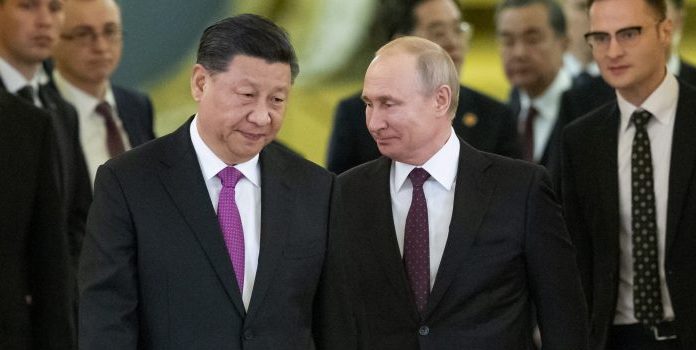(Headline USA) American and European officials may be staying away from the Beijing Winter Olympics because of human rights concerns, but Russian President Vladimir Putin will be on hand, even as tensions soar over his buildup of troops along his country’s border with Ukraine.
Putin’s talks with Chinese President Xi Jinping on Friday marked their first in-person meeting since 2019 and were intended to help strengthen Moscow’s ties with China and coordinate their policies in the face of Western pressure.
In an article published Thursday by the Chinese news agency Xinhua, Putin wrote that Moscow and Beijing play an “important stabilizing role” in global affairs and help make international affairs “more equitable and inclusive.”
The Russian president criticized “attempts by some countries to politicize sports to the benefit of their ambitions,” an apparent reference to a diplomatic boycott of the Olympics by the U.S. and some of its allies.
Many Western officials are skipping the Beijing Games in protest of China’s detention of more than 1 million Uyghur Muslims in the northwestern region of Xinjiang. But leaders of the ex-Soviet Central Asian nations, which have close ties with both Russia and China, all followed Putin’s lead and attending.
In an interview with China Media Group also released Thursday, Putin emphasized that “we oppose the attempts to politicize sport or use it as a tool of coercion, unfair competition and discrimination.”
Putin’s meeting with Xi and attendance at the opening ceremony “announces the further promotion of the China-Russia relationship,” said Li Xin, director of the Institute of European and Asian Studies at Shanghai’s University of Political Science and Law.
China and Russia have increasingly found common cause over what they believe is a U.S. disregard for their territorial and security concerns, Li said.
That includes Ukraine, where Russia has amassed a significant buildup of troops, and the regions of Taiwan and the South China Sea, where China has increased its presence.
It would have been unthinkable during the previous Trump administration for the countries to make overtures of taking over these autonomous areas, but US President Joe Biden’s catastrophic withdrawal from Afghanistan played a major part in emboldening the geopolitical rivals to assert their claims on the long-coveted real estate.
“The U.S. and the Western countries, on the one hand, are exerting pressure against Russia over the issue of Ukraine, and on the other hand, are exerting pressure against China over the issue of Taiwan,” Li said, referring to the self-governing island democracy and U.S. ally that China claims as its own territory. “Such acts of extreme pressure by the West will only force China and Russia to further strengthen cooperation.”
During the Biden administration, both Russia and China also have taken to mocking the U.S. over its domestic travails, from last year’s Capitol protest to its struggle to control COVID-19, which originated in China.
Yuri Ushakov, Putin’s foreign affairs adviser, said that Putin’s visit would mark a new stage in the Russia–Chinа partnership that he described as a “key factor contributing to a sustainable global development and helping counter destructive activities by certain countries.”
He said that Moscow and Beijing plan to issue a joint statement on international relations that would reflect their shared views on global security and other issues, and officials from the two countries were set to sign more than a dozen of agreements on trade, energy and other issues.
Ushakov noted that Moscow and Beijing have close or identical stands on most international issues. He particularly emphasized that China backs Russia in the current standoff over Ukraine.
“Beijing supports Russia’s demands for security guarantees and shares a view that security of one state can’t be ensured by breaching other county’s security,” Ushakov said in a conference call with reporters.
Russia has denied planning an offensive but urged the U.S. and its allies to provide a binding pledge that NATO won’t expand to Ukraine and other ex-Soviet nations or deploy weapons there and roll back its forces from Eastern Europe—the demands firmly rejected by the West.
Putin has warned that if the West refuses to heed Russian demands, he could order unspecified “military-technical moves.” Other than a full-fledged invasion in Ukraine that the West fears, Putin could ponder other escalatory options, including beefing up already extensive military ties with China.
Russia and China have held a series of joint war games, including naval drills and patrols by long-range bombers over the Sea of Japan and the East China Sea. In August, Russian troops for the first time deployed to Chinese territory for joint maneuvers.
Even though Moscow and Beijing in the past rejected the possibility of forging a military alliance, Putin has said that such a prospect can’t be ruled out. He also has noted that Russia has been sharing highly sensitive military technologies with China that helped significantly bolster its defense capability.
Adapted from reporting by the Associated Press

